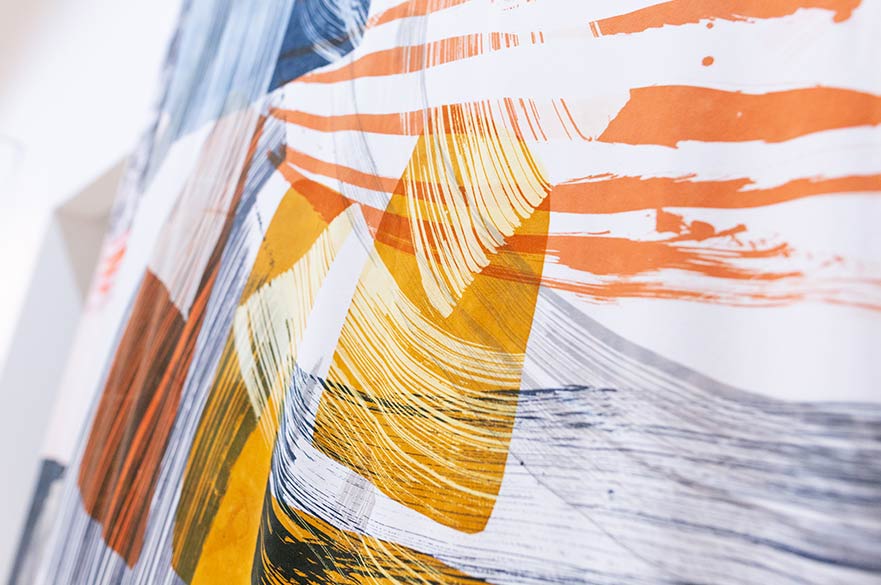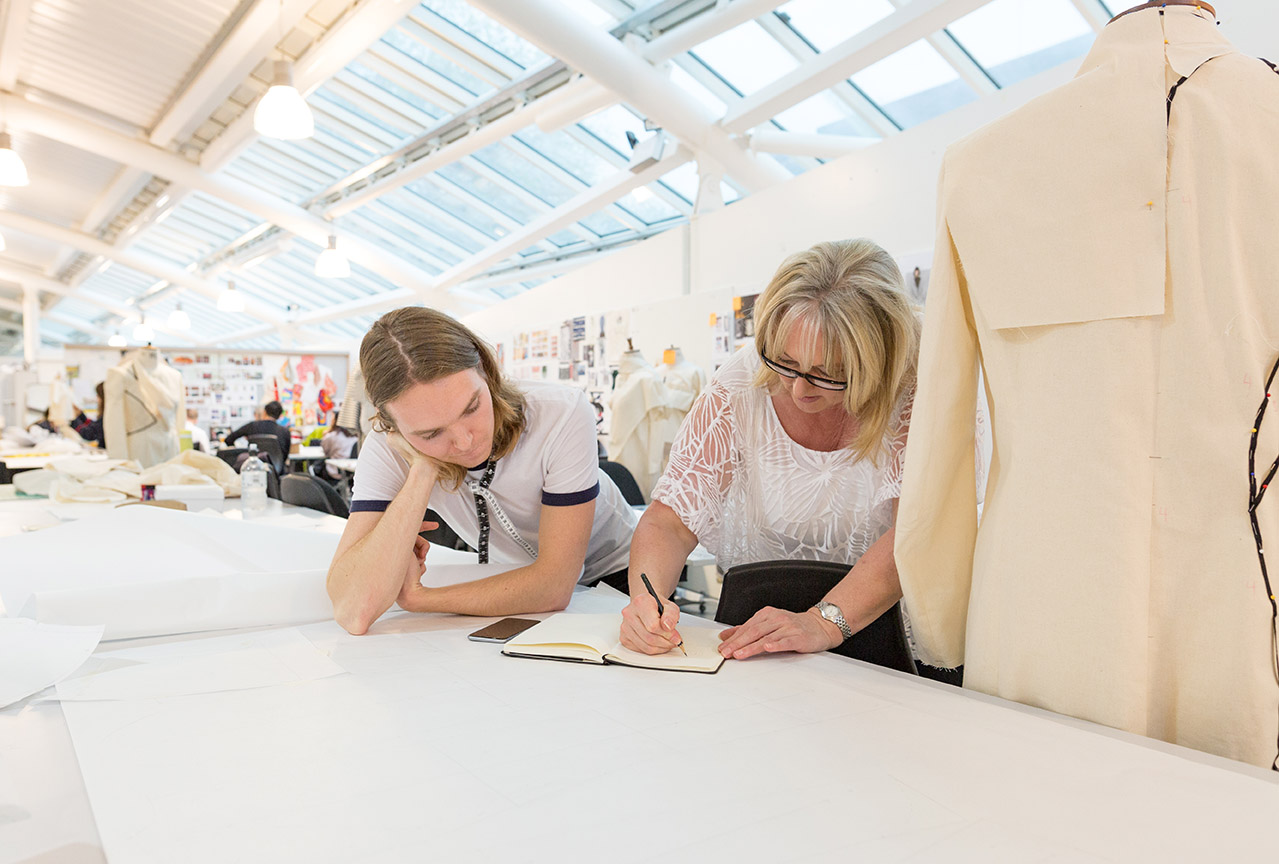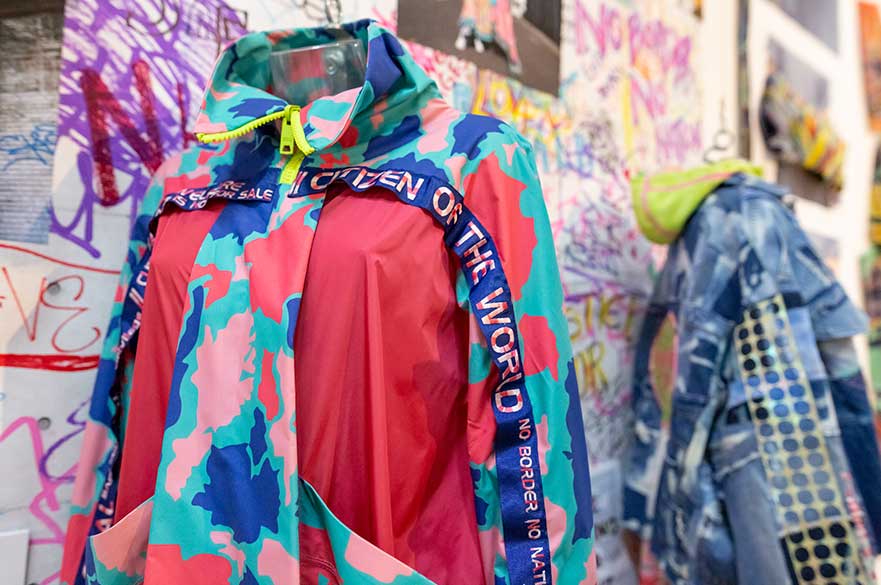Textiles MA
About this course
Our MA Fashion, Textiles and Knitwear courses provide a platform for diverse and creative thinking and design practice to challenge and drive the future of fashion and textiles.
This will be your opportunity to think and do creatively, as be agents of change, to be innovative, take risks, to explore and solve problems.
We encourage a personalised approach to practice and theory that takes account of social, political, environmental, and technological issues, from local and global perspectives.
A critical approach to notions of progress encouraging a deeper understanding of craft, traditional and digital practices, and wider technological developments.
-
Opt for a 20 credit point advanced research module if you’re thinking of progressing to PhD or Professional Doctorate study
-
Benefit from the professional expertise of our academic staff, researchers and visiting designers such as Orsola de Castro, Dr. Katherine Townsend, Karen Nicol, Kit Miles, Lisa Salama, Hannah Croft, Angharad Mclaren, Jo Cope, and Moxham
-
Subject to government guidelines, you may have the opportunity to visit London and join optional European study trips to Florence, Antwerp and Paris
-
You will be invited to submit your work to be considered for exhibition at London’s New Designers, xSelect (formerly Texprint) and SPINEXPO in Shanghai, China.
Browse our student work
What you’ll study
The modular structure of our MA Textiles course provides opportunities for cross-school community building, interdisciplinary thinking and collaboration.
Optional modules provide a bespoke learning experience geared towards individual professional futures.
Culture and Collaboration
(20 credit points)
In this module you will explore themes of ‘Cultural Emergency’ in collaboration with those from other MA disciplines. It will provide you with a fresh insight into your practice, develop advanced research methods and help you define and explore wider possibilities in your practice in interdisciplinary ways.
Situating your Practice
(40 credit points)
For this module you will be inducted to specialist resources in the department and receive workshops relating to your discipline including practical and digital technologies.
You will have opportunities to personalise your study through additional sign-up workshops outside of existing specialist knowledge and skills.
Through engaging in practical experimentation and advancing your specialist knowledge and skills you will interrogate your design practice and potential audience and develop an outline for your major project in the next module
Small group cross-discipline and specialist subject tutorials will aim at engaging you in discussion and debate around practice, design responsibility and audiences.
Innovation in Textile Practice
(100 credit points)
You will build upon your previous outline and identify, develop and realise an individual project focused on achieving your future goals.
Personalisation enables you to align the project to your own ambitions, determining your bespoke outcomes that are most appropriate to support you whether your next steps focus on a career in advanced study, research, gaining employment in industry or setting up your own business.
You will be allocated a Supervisor, whose expertise is most closely aligned to your area of specialism who will support you through your project and the module.
Through a series of verbal and visual presentations, you will be effectively articulating, critically analysing and reflecting upon your progress and the development of your research and design practice and provided with formative feedback that outlines the strengths of your project to date and areas for development.
For the summative assessment, you will be asked to submit an extensive body of work that includes evidence of research and development work and final outcomes appropriate to your chosen audience that address the aims and objectives set out in the proposal.
Optional modules:
Professional Futures
(20 credit points)
This optional module will be an exciting space to investigate and develop thoughts around the future of what employment looks like in the area of Fashion and Textiles. It will be a vehicle for debate and a catalyst for cross-disciplinary opportunities in relation to employment, enterprise and innovations.
You will be delivering a presentation that summarises your findings from a series of short self-initiated activities that could include work placement opportunities, liaising with industry, industry visits and networking opportunities, developing skills and knowledge of new and emerging digital technologies, and how it impacts your own practice and career ambitions and possibilities.
Advancing Research Design
(20 credit points)
An opportunity to develop current postgraduate work through the use of applied research methods as part of a cross-discipline community.
You will explore and critique a range of research methodologies and methods to examine how these can be applied in support of creating coherent research design, and the development of robust outcomes across diverse disciplines.
Extend knowledge of research methods and methodologies to enhance future professional practice; or progression to PhD level study.
We regularly review and update our course content based on student and employer feedback, ensuring that all of our courses remain current and relevant. This may result in changes to module content or module availability in future years.
Don’t just take our word for it, hear from our students themselves
Video Gallery
How you're taught
Teaching and learning experiences will include:
- lectures
- tutorials
- seminars
- inductions
- workshops
- live projects
- study visits
- self-directed research
- independent studio practice
Specific workshops for MA Textile Design Innovation could include:
- drawing and visualisations
- screen printing
- industry specific Adobe CAD software
- embroidery digitization CAD software
- Weave CAD software (weave specialists only)
- Knit CAD programming software (knitted textile specialists only)
- Dubied Hand flatbed knitting (knitted textile specialists only)
- Laser cutting
- Smart textiles / e-textiles
Find out when our postgraduate term dates for the Nottingham School of Art & Design are. Please note that these are slightly different to other Schools within the University.
How you're assessed
Assessment is 100% by coursework and involves:
- Project Proposal
- supporting fashion research and development work
- evidence of reflective practice
- experimental designs
- formal presentation of key developments
- resolved textile designs / fabrications or prototypes
- portfolio and CV
Careers and employability
Career Prospects
This course leads to a wide range of career opportunities including:
- textile designer
- technologist
- buyer
- merchandiser
- production manager
- trend forecasting
- styling for fashion and interior textile companies
You could also work for brands developing innovative design and wearable technologies. Some graduates use this course to support careers in teaching, lecturing, journalism and progression to MPhil or PhD study.
Recent graduates have set up their own successful businesses, or work within related careers in the fashion and textile design sector. Others have returned to their previous job with a renewed focus and enhanced career prospects.
If you are interested in starting your own creative business, the University provides start-up training and support through NTU Enterprise, our centre for entrepreneurship and enterprise.
Connections with Industry
You will have the opportunity to take up short periods of work experience, learn entrepreneurship skills through business development courses and attend events held by our Employability team and other organisations. You will also be encouraged to undertake research into fashion, textile or knitwear design companies, or appropriate contexts, for retailing or showcasing your completed project.
In addition to the main focus of your project as set out in the project proposal, you are encouraged to enter national and international competitions such as the Textile Society Postgraduate Award, Hand and Lock Prize for Embroidery, FESPA Printeriors Design Competition and The Bradford Textile Society Design Competition. Prestigious competitions provide you with opportunities to demonstrate and promote your creative and technical skills and ability to answer an industry brief to a global audience, that can lead to employment and press opportunities.
You will be invited to collaborate on projects and attend research events and symposia. Recent exhibitions our students have been involved in include:
- Crafting Anatomies
- Knitting Nottingham
- Journeys in Lace: Parts 1&2 (Lace:Here:Now)
- Lace Unravelled with Nottingham Castle
- Our students also benefit from visits to Nottingham Castle to explore their extensive fashion and textiles archives
Study trips
Study visits will inspire and inform your projects. Recent visits to exhibitions in London have included:
- Basquiat: Boom for Real at the Barbican
- Balenciaga: Shaping Fashion at the V&A
- North: Fashioning Identity at Somerset House
- Wallace Sewell: 25 Years of British Textile Design at the Fashion and Textile Museum
An optional annual trip to Antwerp and Paris has included visits to:
- Olivier Theyskens: She Walks in Beauty at Mode Museum, Antwerp
- Sheila Hicks: Lines of Life at Centre Pompidou, Paris
- Paris Première Vision
- Li Edelkoort’s Trend Union studio, Paris
You will also be invited to submit your work to be considered for exhibition at London’s New Designers and SPINEXPO in Shanghai, China.
Showcase
Explore our showcase ‘We Are Creatives’ - celebrating the work of the Nottingham School of Art & Design students. You will find a sneak peak of some of our students’ work and gain a real insight into what it’s like to be part of the NTU creative community at wearecreativesntu.art
YouFirst – working with our Employability Team
Our friendly, experienced careers consultants will work closely with you at every stage of your career planning, providing personal support and advice you won't find in a book or on the internet. You can benefit from this at any time during your studies and up to three years after completing your course.
Re:search Re:imagined
To us, research is about more than writing papers and proposing new ideas. By daring to think differently, we’re disrupting the research landscape and finding the answers to the questions that really matter. From electronic textiles to the history of lace, we’re inspiring the brightest minds to rise up and find solutions to some of the most significant global challenges facing society.
Find out more: ntu.ac.uk/research
What our students are doing now
Liss Cooke
At the start of her career, Liss moved to Nottingham for a graduate placement as an embroidery and embellishment designer. She was keen to develop her work further and decided that a Masters at NTU would give her the time and facilities to do that.
Campus and facilities
Our dedicated postgraduate studios are lively, highly creative environments based in the Bonington building, a dedicated art and design hub. You can view all of our Fashion facilities on the Nottingham School of Art & Design Facilities page.
Entry requirements
UK students
Academic entry requirements: 2.2 honours degree in a related subject.
Other requirements: a creative portfolio.
Additional requirements for UK students
There are no additional requirements for this course.
Other qualifications and experience
We welcome applications from students with non-standard qualifications and learning backgrounds and work experience. We consider credit transfer, vocational and professional qualifications, and any work or life experience you may have.
You can view our Recognition of Prior Learning and Credit Transfer Policy which outlines the process and options available, such as recognising experiential learning and credit transfer.
Getting in touch
If you need more help or information, get in touch through our enquiry form.
International students
Academic entry requirements: 2.2 honours degree in a related subject. We accept equivalent qualifications from all over the world. Please check your international entry requirements by country.
Other requirements: a creative portfolio.
English language requirements: See our English language requirements page for requirements for your subject and information on alternative tests and Pre-sessional English.
Additional requirements for international students
There are no additional requirements for this course.
English language requirements
View our English language requirements for all courses, including alternative English language tests and country qualifications accepted by the University.
If you need help achieving the language requirements, we offer a Pre-Sessional English for Academic Purposes course on our City campus which is an intensive preparation course for academic study at NTU.
Other qualifications and experience
We welcome applications from students with non-standard qualifications and learning backgrounds and work experience. We consider credit transfer, vocational and professional qualifications, and any work or life experience you may have.
You can view our Recognition of Prior Learning and Credit Transfer Policy which outlines the process and options available, such as recognising experiential learning and credit transfer.
Sign up for emails
Sign up to receive regular emails from the International Office. You'll hear about our news, scholarships and any upcoming events in your country with our expert regional teams.
Getting in touch
If you need advice about studying at NTU as an international student or how to apply, our international webpages are a great place to start. If you have any questions about your study options, your international qualifications, experience, grades or other results, please get in touch through our enquiry form. Our international teams are highly experienced in answering queries from students all over the world.
Policies
We strive to make our admissions procedures as fair and clear as possible. To find out more about how we make offers, visit our admissions policies page.









